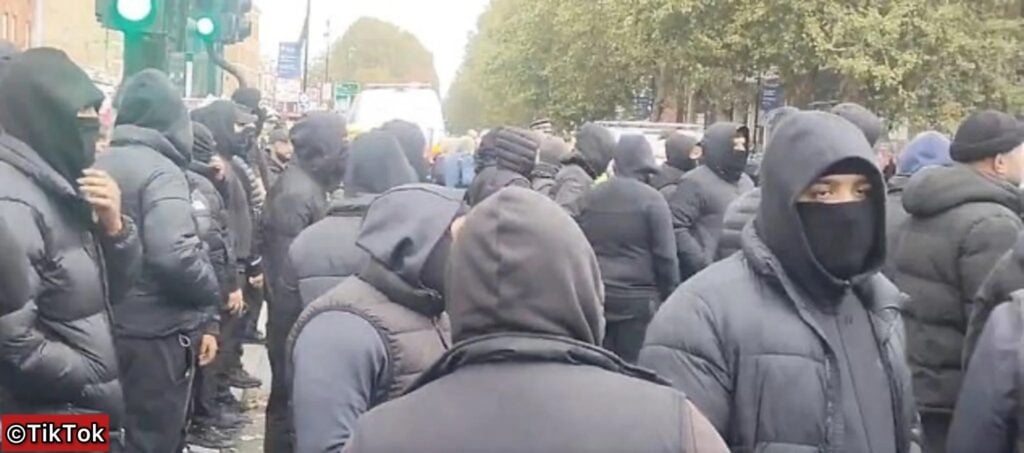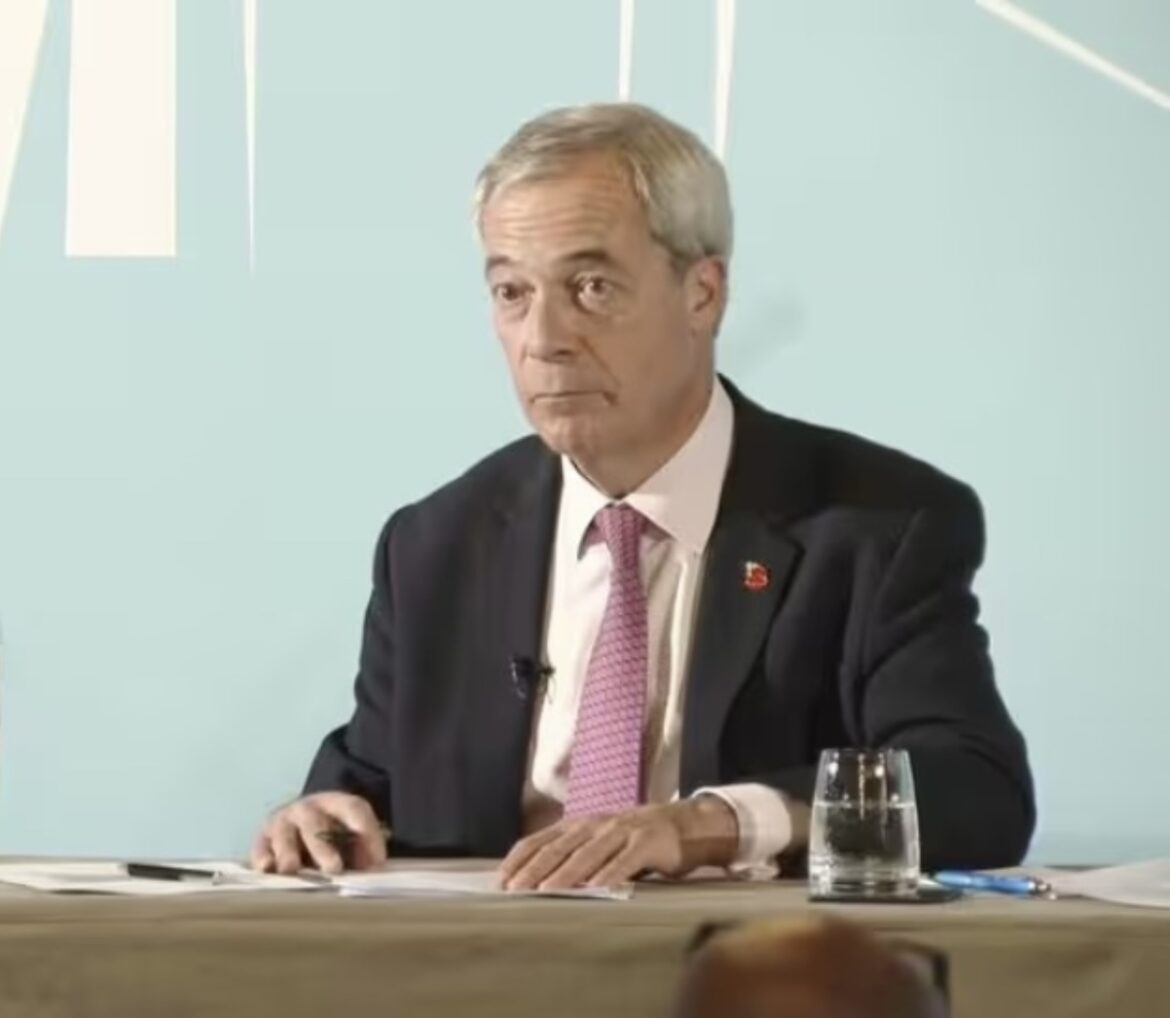Nigel Farage has compared “terrifying” columns of masked Muslim men to a “foreign invading army” marching through British streets when asked about the recent counter-demonstration in east London.
A group of masked Muslim protesters descended on Whitehall to “stand firm” and show that they were “ready to defend our community” in retaliation against a United Kingdom Independence Party protest on Saturday.
Donning black clothing and balaclavas, the group brandished Palestinian and Bangladeshi flags as they marched down central London in scenes that sparked widespread alarm on social media.
Now, finally giving his verdict on the matter, Mr Farage fumed: “There was proper racism happening in Tower Hamlets over the weekend.”
He added derisively that the demonstration featured “intimidation to the point of sort of basically urging the mass wipe out of huge numbers of Jewish people”.
I actually think it’s one of the most terrifying things I’ve ever seen in my whole life,” the Reform UK leader declared.
‘Allahu Akbar’ Chants Through London
Mr Farage’s comments followed the major protest and counter-protest over the weekend, with one of the masked men shouting through a megaphone to “stand firm” and “defend our community”.
The columns of masked Muslim men could be seen chanting “Allahu Akbar” in London as hordes of demonstrators marched through the streets.
Today, the Reform UK chief candidly admitted: “I thought the scenes were absolutely terrifying. It was like a foreign invading army marching through our streets.”
“I defy anyone in this room to tell me that’s wrong. I really, genuinely do.”
The Reform leader’s stark language reflects growing concerns about community tensions and the policing of demonstrations in areas with significant Muslim populations.
UKIP Protest Restricted
The UKIP demonstration was restricted by the Metropolitan Police due to fears of disorder in Tower Hamlets, which has one of the highest Muslim populations in the United Kingdom.
Earlier in the week, the police force made that decision amid fears that allowing the UKIP protest to proceed in the area could stir up “serious disorder”.
The decision was subsequently welcomed by some in the community who argued the UKIP demonstration would be deliberately provocative.
Such conditions meant that the party could not hold their protest in Whitechapel or elsewhere across Tower Hamlets, effectively banning them from the area they had intended to demonstrate in.
Meanwhile, the counter-protest, which was led by organisers at Stand Up To Racism, was allowed to gather in Whitechapel from midday without similar restrictions.

‘Defending Our Community’
On the street, a protester was seen shouting through a megaphone: “They [UKIP] came specifically targeting Islam. They said: ‘We are coming on a crusade,’ they said: ‘We need to take back our streets.'”
“We stand firm to let them know if you come, we will stand firm and will be ready to defend our elders, to defend our women, to defend our community.”
“We have never once said we were going on crusades or going into your areas to cause you problems. You are coming into our homes and you want to cause us problems. What is wrong with us standing up?”
The rhetoric about defending the community and references to “crusades” has raised concerns about escalating tensions between different groups in east London.
Police Defend Decision
Metropolitan Police said that the decision to impose Public Order Act conditions on the UKIP protest was for the sake of public safety and to ensure that order was maintained in Tower Hamlets.
The force argued that allowing the demonstration to proceed in an area with high Muslim population could have sparked serious violence and disorder.
However, critics have questioned why counter-protesters were allowed to gather in masks and balaclavas whilst the original demonstration was banned entirely from the borough.
The sight of masked men marching through London chanting religious slogans has sparked debate about whether police took the right approach in managing the competing demonstrations.
Questions About Policing Approach
Mr Farage’s condemnation highlights broader concerns about two-tier policing, with critics arguing that authorities apply different standards to different groups.
The decision to ban UKIP from Tower Hamlets whilst allowing masked counter-protesters to march has been cited as evidence of inconsistent policing approaches.
Some observers have questioned whether fear of being accused of Islamophobia prevents police from taking firmer action against certain demonstrations.
The sight of columns of masked men marching through central London has alarmed many who view it as intimidating and reminiscent of paramilitary displays.
Community Tensions
The incident reflects deep tensions in Tower Hamlets and surrounding areas, where demographic changes and competing political movements have created friction.
The borough has become a flashpoint for debates about integration, religious extremism and freedom of expression in modern Britain.
UKIP’s decision to target the area for protest was clearly intended to provoke a response, though organisers would likely argue they have a right to demonstrate anywhere in the country.
The counter-demonstration’s masked appearance and religious chanting has provided ammunition to those who argue that certain communities resist integration into British society.
Broader Political Context
Mr Farage’s intervention comes as Reform UK positions itself as the party willing to speak frankly about immigration, integration and cultural tensions that other parties allegedly avoid.
The Reform leader has made law and order and concerns about mass immigration central to his political messaging, arguing mainstream parties ignore legitimate public concerns.
His description of the masked marchers as resembling a “foreign invading army” will resonate with supporters who share anxieties about cultural change in British cities.
Critics will likely accuse Mr Farage of inflammatory rhetoric designed to stoke community divisions and boost his party’s electoral prospects.
The incident and subsequent political reaction demonstrate how questions of free speech, public order and community relations continue to generate intense controversy in contemporary Britain.
Follow for more updates on Britannia Daily



